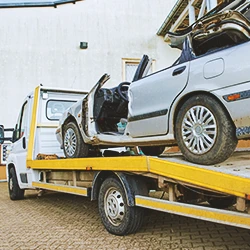Quick Summary
- It is possible to seek legal action against a towing company for illegally towing your vehicle.
- You could sue if you had your car towed or kept in a tow yard without your permission.
- On the other hand, if you prove that the towing company inflicted harm on your vehicle while improperly towing it, this may constitute a breach of their duty of care.
Are Towing Companies Liable For Damage?

When Can You Sue A Towing Company?
You can sue a towing company when they breach their contract or act negligently. This includes overcharging, failing to provide adequate services, causing damage to your vehicle, or violating regulations. Suppose the tow truck operator fails to take due caution or the towing company illegally towed your car, resulting in damage or loss of property from your vehicle. In that case, you can potentially pursue legal action by filing a negligent towing lawsuit against them.Although the ability to fight for towing company damages is available in all states, you should properly understand how these laws apply within your jurisdiction.
Types Of Lawsuits Made Against A Tow Truck Company
Every state, city, and county has specific regulations governing towing practices and consumer rights. If a towing company acts unlawfully—whether by towing a car without permission, charging excessive fees, or damaging a vehicle—legal action may be an option.
The following are the most common lawsuits filed against towing companies, along with real case examples, required documentation, average resolution times, and potential defenses:
1. Illegal Tow
Towing companies must have explicit permission from law enforcement or a property owner before towing a vehicle.
However, they cannot operate deceptively. Some states, like Missouri, require clear signage at all entrances before unauthorized vehicles can be removed.
Real Case Example
In California, multiple vehicle owners sued a towing company for illegally seizing cars without proper authorization. The court ruled in their favor, awarding damages.
Documentation Needed
- Proof that the tow lacked authorization (e.g., absence of police reports or property owner consent).
- Photos of the location showing missing or unclear signage.
- Vehicle registration to prove ownership.
Resolution Timeline & Success Rate
- Timeline: Typically several months to over a year, depending on jurisdiction.
- Success Rate: High if clear proof exists that the tow violated local regulations.
Common Defenses by Towing Companies
- Claiming they had verbal or implicit permission from the property owner or law enforcement.
- Stating the vehicle was in a fire lane or blocking an emergency exit, making immediate towing necessary.
2. Unlawful Business Practices
Many states regulate storage fees, requiring towing lots to be open during regular business hours and clearly post their pricing.
It is illegal for a company to:
- Charge storage fees on days the lot is closed.
- Keep impound yards open for only short windows to collect excessive storage fees.
Real Case Example
A New York tow lot was fined $10,000 for improperly charging storage fees when it was closed.
Documentation Needed
- Receipts proving unauthorized or inflated charges.
- Witness statements confirming limited lot hours or misleading pricing.
Resolution Timeline & Success Rate
- Timeline: Typically weeks to months in small claims court, longer for larger claims.
- Success Rate: High if improper fees can be documented.
Common Defenses by Towing Companies
- Arguing that fees were properly disclosed and legally collected.
- Stating that the owner failed to retrieve the vehicle within the allowed timeframe.
3. Negligence
Towing companies are required to handle vehicles with reasonable care. If your vehicle is damaged during transport or while in storage, you may have grounds for a negligence claim.
To prove negligence, you must establish:
| Element | Description |
|---|---|
| Duty | The company had a responsibility to handle the vehicle safely. |
| Breach | They failed to uphold this responsibility (e.g., improper securing, reckless driving). |
| Causation | The damage was directly caused by the towing company’s actions. |
| Damages | You suffered financial loss due to vehicle repairs. |
Real Case Example
A plaintiff in Illinois won $8,000 after proving a tow truck driver’s improper securing of their vehicle led to a damaged bumper.
Documentation Needed
- Before-and-after photos of the vehicle.
- Repair estimates and invoices.
- Witness statements confirming the damage occurred due to improper towing.
Resolution Timeline & Success Rate
- Timeline: Often settled within months, but can take over a year if litigated.
- Success Rate: High when strong evidence exists proving the damage was caused by negligence.
Common Defenses by Towing Companies
- Claiming the damage was pre-existing.
- Asserting that their handling of the vehicle met industry standards.
Also Read:Negligence vs Intentional Tort
4. Breach of Bailment
A bailment occurs when a towing company takes temporary custody of a vehicle and is responsible for its safekeeping.
If your car or personal property is lost, stolen, or damaged while in their possession, it could be considered a breach of bailment.
Real Case Example
In Texas, a vehicle owner recovered $12,000 after proving their personal belongings were stolen from an impound lot.
Documentation Needed
- Police reports documenting stolen items.
- Photos or video evidence showing the vehicle’s condition before impoundment.
Resolution Timeline & Success Rate
- Timeline: Typically under six months, but complex cases may take longer.
- Success Rate: High if the company failed to meet basic security requirements.
Common Defenses by Towing Companies
- Arguing they took reasonable security precautions.
- Claiming the loss was outside their control (e.g., theft by a third party).
5. Conversion
Conversion occurs when a company illegally withholds your vehicle even after you paid all required fees. This is considered an intentional tort and can lead to lawsuits for damages.
Real Case Example
In Florida, a vehicle owner won $15,000 after a towing company refused to release their car despite full payment.
Documentation Needed
- Receipts proving the full amount was paid.
- Police reports documenting the company’s refusal to return the vehicle.
- Witness statements confirming the dispute.
Resolution Timeline & Success Rate
- Timeline: Typically resolved within three months via mediation, but could take six months or more in litigation.
- Success Rate: High when payment receipts confirm the tow company wrongfully retained the vehicle.
Common Defenses by Towing Companies
- Arguing additional fees were still owed.
- Claiming a miscommunication in their records caused the delay.
Factors to Consider Before Taking Legal Action Against a Towing Company
Taking legal action against a towing company requires preparation and an understanding of your rights. Before filing a claim, follow these key steps to strengthen your case:
1. Notify Your Insurance Company
Your first step should be contacting your insurance provider. Some policies cover towing-related damages, helping you avoid unnecessary legal expenses [2].
What You Need to Provide:
- Photos of your vehicle before and after towing, showing any damage.
- A copy of the tow receipt listing fees charged.
- Police reports (if applicable), especially if the tow was illegal.
- Repair estimates from a certified mechanic.
Each state has different rules regarding insurance coverage for towing-related damages. Check with your provider to see if your policy applies.
2. Talk to the Towing Company
Before filing a lawsuit, try to negotiate a resolution directly with the towing company. Some companies may agree to refund improper charges or compensate for damages if you present strong evidence.
How to Approach Negotiations:
- Remain professional and avoid confrontations.
- Provide supporting documentation, such as photos, receipts, and witness statements.
- Request a written response from the company regarding your complaint.
Sample Demand Letter Template:
If the towing company refuses to cooperate, send a formal demand letter before escalating to legal action.[Your Name]
[Your Address]
[City, State ZIP Code]
[Email Address]
[Phone Number]
[Date]
[Name of Towing Company]
[Company Address]
[City, State ZIP Code]
Subject: Formal Demand for Compensation – Unauthorized Towing/Damages
Dear [Towing Company Representative],
I am writing regarding the towing of my vehicle on [Date] from [Location]. I believe this tow was unauthorized and/or resulted in damages to my car. Please find attached documentation, including photos, repair estimates, and receipts, supporting my claim.
I request reimbursement of [$Amount] within 14 days of this letter. If we cannot resolve this matter, I will consider further legal action, including filing a claim in small claims court.
Sincerely,
[Your Name]
Attachments: Photos, Repair Estimates, Receipts
3. Consider Filing a Claim in Local Small Claims Court
If negotiations fail, small claims court may be your best option. It’s a cost-effective legal route for recovering damages from improper towing practices.
Steps to File a Small Claims Lawsuit:
- Gather Documentation: Collect all relevant evidence, including tow receipts, photos, police reports, and repair estimates.
- Check Your State’s Claim Limits: Most states cap the amount recoverable in small claims court.
- File Your Case: Submit the required paperwork to your local court and serve notice to the towing company.
What Compensation Can You Seek From a Towing Company?

What Damages Can You Receive?
The damages that you can receive depend on the facts of your claim. You could be eligible to receive various kinds of damages, such as compensatory and punitive ones [3].
1. Compensatory Damages
Compensatory damages aim to reimburse you for any financial loss related to an improper tow. These damages may cover:
- Towing and Storage Fees: If the tow was illegal or unauthorized, you may be eligible to recoup all associated costs.
- Vehicle Damage Repairs: If your car was scratched, dented, or mechanically damaged, compensation can cover repair costs.
- Lost Property or Personal Items: If belongings were lost or damaged during towing, you may be reimbursed for their value.
- Additional Expenses: Costs such as alternative transportation (e.g., rental car fees) due to the tow may also be included.
Each state has minimum claim amounts and specific regulations regarding towing disputes. Seeking legal counsel can help determine how much compensation you are entitled to.
How to Maximize Your Compensation:
- Take Photos: Document damage before and after retrieving your vehicle.
- Keep Receipts: Hold onto any repair bills, towing receipts, and storage fee invoices.
- File a Police Report (if applicable): This can serve as evidence in legal proceedings.
2. Punitive Damages
In cases where a towing company acted maliciously, fraudulently, or recklessly, punitive damages may apply. Unlike compensatory damages, which reimburse for losses, punitive damages punish the wrongdoer to deter future misconduct.
When Are Punitive Damages Awarded?
- If a tow company knowingly towed your car illegally.
- If they falsified records, overcharged intentionally, or refused to return a vehicle despite full payment.
- If they damaged your car due to reckless handling.
These cases are less common, but when successful, punitive damages significantly increase settlements. Consulting with a lawyer can help determine if you qualify.
Also Read: Impounded Car in Nevada?
What to Do If a Towing Company Damages Your Vehicle
If your vehicle was damaged by a towing company, you have legal options to seek compensation. Acting quickly and gathering the right evidence can strengthen your case.
The following outlines the essential steps to help you recover damages and hold the towing company accountable.
1. First 24 Hours After Illegal Towing
The first 24 hours are crucial in establishing the details of your case. Taking immediate action will help prevent further complications and ensure you have the necessary documentation.
- Contact Authorities: If you believe the tow was illegal, report it to local law enforcement. A police report can serve as valuable evidence in your case.
- Locate Your Vehicle: Find out where your car is being held and confirm its condition before removing it.
- Notify Your Insurance Company: Some insurance policies cover towing-related damages. Contact your insurer as soon as possible to explore your options.
Once you have completed these initial steps, the next priority is gathering solid evidence to support your claim.
2. How to Document Damages
To build a strong case, you must gather clear and compelling evidence that proves the damage occurred while the vehicle was in the towing company’s possession.
- Take Photos and Videos: Before moving or repairing the vehicle, take high-quality images of any damage from multiple angles. Compare these with any previous pictures you have of your car.
- Get Repair Estimates: Visit at least two reputable mechanics to obtain written repair estimates that outline the cost of fixing the damage.
- Collect Witness Statements: If anyone saw the towing process or noticed damage at the impound lot, ask them to provide a signed statement.
- Keep Records of Communications: Document every conversation you have with the towing company, your insurance provider, and local authorities. Save emails, receipts, and any legal notices.
With thorough documentation in hand, your next step is to carefully handle interactions with the impound lot.
3. Dealing with Impound Lots
Retrieving your car from an impound lot requires caution. Avoid making any statements or signing documents that could waive your right to compensation.
- Visit in Person if Necessary: Inspect your vehicle carefully before signing any paperwork. If the lot is refusing access or behaving uncooperatively, document their actions.
- Request Release Documents: Ensure you receive all necessary paperwork, including invoices and details of the tow. This can be useful for filing claims or legal complaints.
Once your vehicle is secured, you can move forward with seeking compensation from the towing company.
4. Negotiating with Towing Companies
Before pursuing legal action, you may be able to resolve the issue directly with the towing company. Negotiation is often the fastest and most cost-effective way to recover damages.
- Send a Demand Letter: Formally request compensation by detailing the damage, including supporting evidence such as photos and repair estimates. Clearly state the amount you are seeking and set a deadline for their response.
- Communicate in Writing: Keep all discussions in emails or letters to create a clear paper trail. Avoid discussing your case over the phone, as verbal agreements are harder to prove.
- Seek Fair Compensation Based on Evidence: Be firm but reasonable when requesting reimbursement for towing fees, storage costs, and repair expenses. If the company refuses to cooperate, prepare to escalate the matter.
If negotiations fail, you may need to take legal action to recover your losses. Understanding your legal options will help you make an informed decision.
Small Claims vs. Full Lawsuit
Depending on the extent of the damage and the amount of compensation you seek, you may have the option to file a claim in small claims court or pursue a full lawsuit.
Small Claims Court:
- Best suited for cases involving smaller amounts, typically under $10,000 (varies by state).
- A simplified process where plaintiffs can represent themselves without hiring an attorney.
- Offers a quicker resolution compared to full lawsuits.
Full Lawsuit:
- Necessary for larger claims exceeding small claims court limits.
- Requires legal representation, making it a more complex and costly process.
- May allow for punitive damages if the towing company’s actions were especially reckless or intentional.
If you are unsure about which legal route to take, consulting with an attorney can help you determine the best course of action based on the specifics of your case.
State Laws and Statute of Limitations
Towing regulations and legal timelines vary by state. Below are a few examples:
| State | Statute of Limitations | Key Regulations |
|---|---|---|
| California | 1 year (for property damage claims) | Requires a demand letter before suing. |
| Florida | 3 years (varies by claim type) | Strict signage rules for private towing. |
| Texas | 2 years (for most claims) | Tow companies must keep records of all impounded vehicles. |
If you’re unsure of your state’s laws, consult a consumer protection agency or attorney for guidance.
Cost Estimates for Legal Action
Legal fees can add up quickly, so it’s important to weigh the costs before proceeding with a lawsuit.
| Expense Type | Estimated Cost |
|---|---|
| Small Claims Filing Fee | $20 - $100 |
| Process Server Fee | $50 - $200 |
| Legal Consultation (if needed) | $100 - $300 per hour |
If your damages are minor, the cost of legal action might outweigh the benefits. If you’re unsure, seek legal advice or file a complaint with your local consumer protection office before proceeding.
See all related personal injury and accident lawsuits we've covered.
FAQs
Can I Sue a Towing Company for Small Claims?Yes, you can sue a towing company for small claims. Resolving your dispute with the towing company may be more cost-effective if you take it to small claims court.What to Do if a Towing Company or Tow Truck Damages My Car?If a towing company or tow truck has damaged your car, you can take legal action against them in court or file an insurance claim for compensation.How to Sue a Towing Company in Small Claims Courts?To sue a towing company in small claims courts, you must first determine if you have a valid legal claim against the tow company. This typically involves filing an official complaint with the court, gathering evidence to support your case, and presenting your case in front of the judge.
Get Legal Assistance and Consult an Attorney
If you've suffered an injury, enlisting the help of a personal injury attorney may be your best bet. Contact Schmidt & Clark, LLP and speak to our attorney in a free consultation session. We'll help you understand the nuances of your situation and determine if you have a legal case.Having a lawyer on your side can make negotiating with insurance companies or towing businesses much easier, even if legal action isn't taken.
References:
- https://www.law.cornell.edu/wex/negligence
- https://www.mass.gov/service-details/frequently-asked-questions-about-auto-insurance-claims
- https://statutes.capitol.texas.gov/Docs/CP/htm/CP.41.htm

 Published by
Published by 



